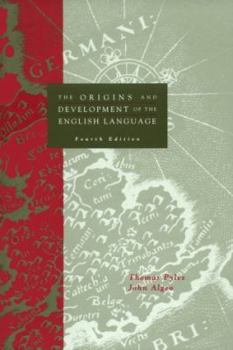The Origins and Development of the English Language
Select Format
Select Condition 
Book Overview
THE ORIGINS AND DEVELOPMENT OF THE ENGLISH LANGUAGE reflects current research and takes a linguistic-analysis approach with a focus on the facts of language rather than on theoretical approaches. This description may be from another edition of this product.
Format:Hardcover
Language:English
ISBN:015500168X
ISBN13:9780155001688
Release Date:January 1993
Publisher:Cengage Learning
Length:381 Pages
Weight:1.45 lbs.
Dimensions:0.8" x 6.6" x 9.5"
Customer Reviews
5 ratings
lovely intellectual writing, wonderful linguistic material, fun to read
Published by Thriftbooks.com User , 17 years ago
Like Josh, I had to buy this book for the History of English course in the Linguistics dept at Portland State University. My instructor was Prof. Jennifer Mittelstaedt in 2006. Also like Josh, I know this "textbook" is a keeper that will stay in my home library as a professional resource, long after I graduate. Beautifully designed with pretty cover and crisp font/layout. (Expensive, but a nice book that gives pleasure to read & hold.) Organized into easily digestible and somewhat independent sections; the many verb-class & declension tables are clearly explained. Easy to pick-and-choose which chapters to assign, if time constrained. Fascinating historical linguistics & splendid etymologies, presented with surprising humor. The writers' "voice"(s) exude a warm, mature amusement at the vicissitudes of human history - and there is certainly an abundance of vicissitude in the history of the English language! Covers morphology, semantics, syntax, and phonology of OE, ME, EModE & PDE periods. Highly recommended!
W00t.
Published by Thriftbooks.com User , 19 years ago
I must say that this book is genuinely exciting. In this case, you may judge the book by the cover (I think the cover's pretty nifty, anyway). I guess you have to be into this sort of thing (linguistics) to pick up this book in the first place, but once you do, don't be afraid to read it straight through. You won't be disappointed. You learn so many interesting tidbits (and they actually have come in handy a few times). I also suggest THE MOTHER TONGUE, by Bill Bryson (come on, it's fun, even if some of the content is questionable). Together with this book you'll be a language whiz. ORIGINS AND DEVELOPMENT OF THE ENGLISH LANGUAGE isn't only for geeks, mind you. There's a helpful index at the back and if you want to learn more about a word or a particular age in our language's history, it's no trouble. A la fin, this book is worth however much money it costs. It's really, really super.
educational, fascinating, and fun!
Published by Thriftbooks.com User , 20 years ago
"sklon'yat'... vo vs'ekh pad'ezhakh" -- "to decline (someone) in all the cases", so the Russian idiom goes. To discuss someone at length. Few speakers of modern English would make much sense of that idiom. Yet English was once nearly as inflected as Russian, having in common five of that language's six noun cases: the Nominative, Accusative, Genitive, Dative, and Instrumental, each with corresponding pronominal and adjectival declension. Old English nouns had gender, too, and not just masculine and feminine as in the "Romance" (Italic) Languages, but, like Russian, the neuter as well. English verbs once required more complex conjugation, and the subjunctive was used far more extensively than today. Old English structurally resembled modern European languages, and until comparatively recently, even had formal and informal second-person address. The reason for these similarities? Six modern language groups all descended from a common ancestor, Indo-European. They include Indo-Iranian (Farsi, Hindi, Romani), Balto-Slavic (Lithuanian, Russian, Polish), Celtic (Gaelic, Cornish, Welsh), Italic (French, Spanish, Roumanian), Germanic (German, Icelandic, Norwegian), and Hellenic (Greek). English is a sub-group of the Germanic branch. This book is a fascinating technical study of how English developed and changed over the centuries and was influenced by various languages and regional dialects. From Chaucer to Shakespeare to Melville to present, you'll see how English has become simplified yet enriched. Learn the reasons for the varying pronunciations of our vowel combinations and consonant clusters that drive ESL students nuts! This is a scholarly study. But you don't have to be a linguist to enjoy the text. Even the most etymologically "challenged" will easily see some distinctive similarities between Old and modern English and other Indo-European languages. BTW, that Russian idiom? We English speakers would discuss someone "every which way".
FASCINATING!
Published by Thriftbooks.com User , 23 years ago
Every aspect of the English languageis presented clearly and delightfully. Why does "ea" have three different pronunciations in "dream," "thread," and "great"? How did the Danish conquest of Engliand affect words like "sky" and "egg"? What words did the Roman Latin leave in English? Pyles writes great English himself.
THIS VERSION IS 5x AS EXPENSIVE AS THE PAPERBACK.
Published by Thriftbooks.com User , 24 years ago
Save your money. Buy this excellent, if technical, book in paperback. Be good to yourself. Save the $55.




